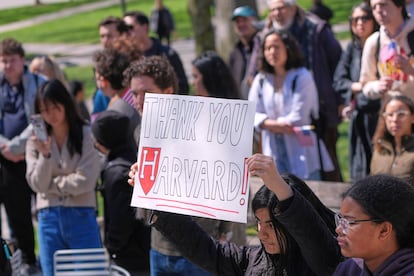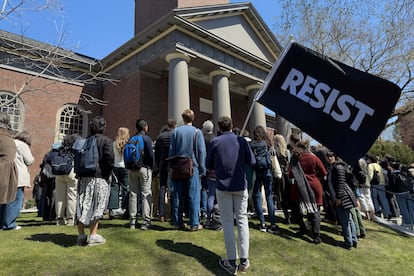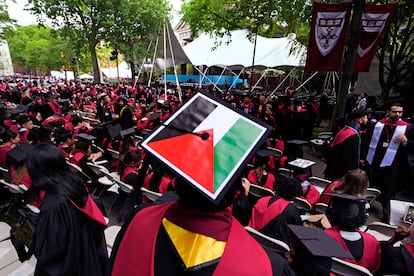Harvard stands up to Trump: ‘A tremendous battle will have to be fought to defend academic freedom’
The most powerful university in the United States, supported by a growing number of schools, has rejected the Republican administration’s attempts at subjugation and censorship over alleged antisemitism on campus


As a good businessman rather than a politician, Donald Trump has managed to put a price on an intangible asset: academic freedom. So far, it has cost Harvard more than $2.2 billion to oppose the Republican administration’s attempt to discipline it by silencing uncomfortable opinions, such as criticism of Israel or diversity policies that support minority groups.
Of the $9 billion in federal funding the university receives, the withdrawn portion is critical — covering scholarships, medical research programs, and even hospitals staffed by professionals trained within its walls.
Harvard, many argue, is the only university in the White House’s crosshairs that can afford to push back because it is the wealthiest (with an endowment exceeding $50 billion) and the oldest (338 years) in the country: it is the alma mater of eight U.S. presidents. But what is at stake in Washington’s extortion is not only the future of one of the most prestigious universities in the world — and by extension, that of the others being threatened — but of freedom itself: the kind that, sometimes precariously, as now, is shaped by ideas.
“What’s happening at Harvard, Columbia, and other universities is unprecedented in U.S. history. What the government is seeking is subordination, subjugation, and that’s terrible and must be resisted,” says Kendall Kennedy, a law professor and co-director of Harvard’s Academic Freedom Council, a kind of inner sanctum within the university, which on Wednesday saw subdued activity, partly due to the Easter holidays, but more so due to a marked reluctance toward media exposure.
“I’m very pleased that Harvard University and Princeton University, and others [like Stanford and Yale, which supported the protest on Tuesday], are doing so. I’m very pleased that those responsible for higher education seem to be uniting more strongly in defense of educational autonomy and academic freedom,” adds Kennedy.
The letter with which President Alan Garber responded on Monday to the government’s demands marked a milestone in the relationship between the two parties — perhaps a turning point, or perhaps an academic swan song. After Harvard rejected the administration’s demands, Washington announced the aforementioned funding cuts and the end of the university’s tax exemption, as well as its intention to prohibit foreign students from attending if the university does not provide their data.
“It is a privilege to have foreign students attend Harvard University, not a guarantee,” Homeland Security Secretary Kristi Noem wrote Wednesday, accusing the institution of creating “a hostile learning environment” for Jewish students.
The escalation makes it difficult to imagine how the standoff will end. “We’ll see; it’s still very early, and we’re at a very dangerous point,” Kennedy insists. “This administration is obviously going to continue its attacks. I’m pleased with what President Garber has done, but it’s very early stages, and we don’t know what’s going to happen. The forces arrayed against the universities are very powerful, and we’re still at a very dangerous point, which will, in fact, continue for some considerable time… This isn’t going to end tomorrow, or next week, or next month, or even next year. This fight will last quite a while.”
The Harvard episode is, for now, the climax of the Republicans’ scorched-earth campaign against elite universities — a campaign that surged after campus protests erupted in October 2023 over the war in Gaza. But the roots go much deeper, part of a long-simmering culture war that has now reached a boiling point.
David Pozen, a law professor at Columbia, takes the long view to explain the conflict. “In retrospect, this escalation was predictable. Vice President [J. D.] Vance gave a speech in 2021 titled ’The Universities Are the Enemy.’ The Heritage Foundation’s Project Esther [the blueprint of Trumpism] advocates the use of counterterrorism tactics to ‘disrupt and degrade’ student activism in the name of combating antisemitism. Still, the speed and scale of President Trump’s efforts to tear down higher education have surprised many,” says the constitutional scholar.

After Harvard stood up to the government, Columbia University seemed to find new energy to also oppose Washington’s demands — demands it had conceded to at the end of March, although negotiations are still ongoing. Less than 12 hours after Garber’s letter, Columbia’s interim president — the campus crisis has swept away her two predecessors — promised to reject any agreement that would erode the institution’s independence. The government had previously threatened to place the university under judicial oversight if it did not comply with its demands, including tougher rules governing protests, allowing private campus security guards to arrest disruptive students, and conducting an external audit of ideologically sensitive departments such as Middle Eastern Studies.
For most universities, the question isn’t whether to oppose Washington’s demands — which boil down to two main points: the all-out fight against alleged antisemitism and the dismantling of diversity, equity, and inclusion policies, which the White House contrasts with merit-based admissions. The real question is what will come next, or more precisely, who will have the final say.
Beth, a resident of Cambridge — the town of 120,000 people that’s home to the campuses of Harvard and MIT — is a professor at Boston University, also a private institution. She usually starts her day with a pleasant walk through Harvard’s charming campus. Last Wednesday, on a sunny but chilly morning — as cold as the mood among students and faculty — with the campus swarming with visiting families in an atmosphere somewhere between festive and tense, she applauded Garber’s decision. Garber replaced former Harvard president Claudine Gay, who resigned in January 2024 under pressure from Jewish donors and students.
“It’s finally reacted. This university remained silent for too long and even allowed the sacrifice of President [Claudine] Gay, which emboldened critics,” says Beth. “They’ve all conceded too much. Garber took his time, but he had to [stand up], because it’s impossible to put up with any more. I was surprised, to be honest, I thought he was going to remain on the sidelines. Columbia, where I graduated, has put on a pitiful show by accepting the administration’s demands. But Harvard is putting its reputation as an academic beacon on the line, so the president had no choice but to stand his ground.”
As for the mood at Columbia University, Beth says the situation is tense. “Not even a fly is moving, out of fear,” she says, shrugging.
Revoking the tax-exempt status of rebellious universities — which Trump says are “pushing political, ideological, and terrorist inspired/supporting Sickness,” a disease that encompasses alleged antisemitism and woke ideology — is a tough goal to realize. Under the law, most universities are exempt from federal income tax because they are considered to “operate exclusively” for public educational purposes (even if they are private institutions). In Professor Pozen’s view, “Trump has no authority to revoke Harvard’s tax exemption. The Internal Revenue Code has long exempted educational institutions like this from paying federal income taxes, and only Congress can change that.” Washington’s plan, he emphasizes, “is just the umpteenth anarchic threat from an anarchic administration.”
Harvard professor Steven Levitsky agrees. “This is part of an authoritarian assault against our country’s institutions. In democracies, universities are not attacked by the government,” he told CNN last week. Levitsky, an expert on dictatorships and co-author of the book How Democracies Die, spearheaded a letter signed by 800 faculty members urging Harvard to defend itself — and academic freedom — through “a coordinated opposition to these antidemocratic attacks.” After Levitsky’s letter circulated — he is Jewish and believes the alleged antisemitism on campuses is just a pretext to silence them — Garber stood up to the administration.
In its punishment of Harvard — currently adorned this spring with scrawny cherry trees and massive magnolias bowed under the weight of their blossoms — the Republican administration bypassed procedural requirements, such as holding a hearing to determine whether, as it claims, the university violated Title VI of the Civil Rights Act, which prohibits discrimination.
The administration got away with freezing the $2 billion in federal funds without providing any evidence of wrongdoing. In its crusade against what it calls antisemitism on campus — often simply slogans supporting a ceasefire in Gaza or Palestinian rights — the same lack of evidence prevails: students arrested for protesting last year were accused, without proof, of aligning with Hamas or Hezbollah terrorists. The Department of Education has launched investigations on this pretext into more than 60 colleges and universities, while the government scrutinizes the digital footprint of suspicious students and has started a crackdown and deportation of activists. Since the end of March, at least 1,024 students from 160 institutions have had their visas revoked or terminated.
Hann, an information technology student, sums up the atmosphere — somewhere between fear and euphoria — that Garber’s stance has cast over the campus: a sense of relief, though the government’s breath is still felt on their necks. She is one of the few students or professors willing to speak — most of those approached (a polite chemistry professor, another prickly one parking her bike near the Science Center, a dozen fleeting students) declined to comment, as did another dozen faculty members contacted by phone or email.
“I understand that individually many don’t want to talk, because there is fear and anxiety, especially among international students, who depend on a visa. But collectively, as a community, Garber’s letter has made us stronger, empowered us, and most of us feel proud of this university, now unequivocally. We feel supported. Harvard is stronger now, united,” the young woman says. Beside her, a student with Asian features shakes his head and objects that at some point “both sides will have to start talking, because neither the government’s demands are clear, nor is what Harvard has done to correct what it is accused of” — that is, tolerating alleged antisemitism on campus.
Professor Kennedy echoes Hann’s sense of pride. Not surprisingly, Harvard is the first major institution in the country to openly stand up to the Republican administration, despite the fact that major law firms, media outlets, and even federal judges have also been in the firing line of the White House, subjected to coercion and threats.
“I was in my office on Monday when I received the email [from Garber]. I knew it was going to be about the university’s response, and I started reading it with tremendous anxiety because I didn’t know what it was going to say. But when I saw that sentence: ‘Basically, we are not going to give in to the government’s demands,’ I cried out in relief. The morale of this university soared. I think there are a lot of people here who feel tremendous solidarity with Garber and who will do everything they can to protect academic freedom,” Kennedy says, “but I insist that it will be a tremendous battle.”

With swords raised, it is difficult to imagine what the next move will be — an armistice or the guillotine — because, in addition, the very speed of events adds dimension to the conflict. Journalist and writer Peter Beinart, a Jewish critic of the Israeli military offensive in Gaza, recounted on Wednesday in a Zoom call that he was recently invited to present his latest book, Being Jewish After the Destruction of Gaza, at Harvard Divinity School, as part of a program called the Religion, Conflict and Peace Initiative. “Something strange happened: between the time I was invited and the time I gave the talk, the program was canceled, and the fantastic professor who invited me will no longer be in his position. It was the result of pressure from the Trump administration and from donors and elements of the American Jewish community who claim that this program is biased and one-sided, that it focuses too much on Israel and Palestine.”
For Beinart, it’s the vicious argument that will be used “to destroy academic programs or to seize control of universities by the administration, by other forces that want to push them to the right.” The big contradiction: censoring opinions in order for universities to have, as the administration demands, “more diversity of viewpoints.”
Beth recalls how, in the recent protest in support of Harvard by the residents of Cambridge, next to Boston, many faculty members participated personally and discreetly. “The mayor joined the protest, as did several Harvard colleagues, obviously outside the campus; such a gathering on campus would be ammunition for the government.”
Separately, in a bookstore in the city, one of those colleagues, who remains anonymous — refusing to provide his name or the subject he teaches — doesn’t hold back on his criticism of the Republican offensive. “It’s pure fascism; it’s incredible that we haven’t learned from history. Or even from the present, from what’s happening in Hungary, Italy, or India: dictatorial tendencies that wipe out all dissent in their path. That’s what awaits us if we don’t stand up to the threats, to the most vile blackmail imaginable, because it jeopardizes the future of our students and, therefore, the future of the country itself.”
After almost a year and a half of complete silence, the academic opposition to the White House is gaining strength. Harvard has taken the first step, but presidents of other universities are also speaking out against the relentless pressure from Trump. “Princeton has made it clear that the university is willing to stand up to the administration. The president of Wesleyan has been very outspoken in his defense of academic autonomy and in his criticism of the administration. Harvard is not alone. But it is different. It is the best-known university, the richest, and if it tries to prevail alone, it will fail. We can’t do it alone; we’re going to need allies,” Kennedy concludes.
The anonymous professor points out an unforeseen factor that the administration doesn’t seem to have considered when canceling research programs. “They, the Republicans, also suffer from cancer and Alzheimer’s, and naturally they want the best medical care and attention. They don’t realize that cutting [funding] jeopardizes their own health and that of their loved ones.” Freezing grants and aids will have an extraordinary impact on the School of Public Health. This fiscal year, approximately 46% of its budget came from federal research funds.
The day after the Harvard president took a stand, a prominent researcher received an email from the government urging her to abandon her work on tuberculosis, as the $60 million contract involving more than a dozen labs from other faculties was canceled. “Our partnership with the federal government has powered discoveries and solutions that have saved tens of millions of lives around the world,” Dean Andrea Baccarelli said in a statement.
A medical professor specializing in ALS, who was researching early diagnosis of the disease, has also lost his annual grant. “This cancellation will cost lives,” he told CNN. It’s a chilling moment when the pillars of knowledge, culture, and science are being undermined in the increasingly disturbed United States of Donald Trump.
Sign up for our weekly newsletter to get more English-language news coverage from EL PAÍS USA Edition
Tu suscripción se está usando en otro dispositivo
¿Quieres añadir otro usuario a tu suscripción?
Si continúas leyendo en este dispositivo, no se podrá leer en el otro.
FlechaTu suscripción se está usando en otro dispositivo y solo puedes acceder a EL PAÍS desde un dispositivo a la vez.
Si quieres compartir tu cuenta, cambia tu suscripción a la modalidad Premium, así podrás añadir otro usuario. Cada uno accederá con su propia cuenta de email, lo que os permitirá personalizar vuestra experiencia en EL PAÍS.
¿Tienes una suscripción de empresa? Accede aquí para contratar más cuentas.
En el caso de no saber quién está usando tu cuenta, te recomendamos cambiar tu contraseña aquí.
Si decides continuar compartiendo tu cuenta, este mensaje se mostrará en tu dispositivo y en el de la otra persona que está usando tu cuenta de forma indefinida, afectando a tu experiencia de lectura. Puedes consultar aquí los términos y condiciones de la suscripción digital.








































